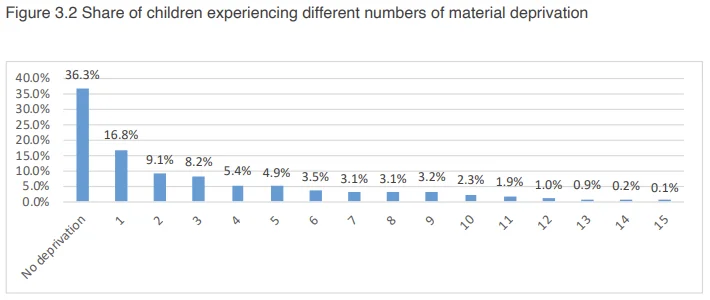
Survey: 38% of Children in Georgia Face Material and Social Deprivation
The survey Child Wellbeing in Georgia conducted by the National Statistics Office of Georgia (Geostat) with support from UNICEF and published on April 20 notes that while in the past few years, the Government of Georgia has substantially increased the number of children reached and the amount received under the child benefit program, “38% of children in Georgia are affected by material and social deprivations.” Moreover, almost half of materially deprived children (47%) do not benefit from the program, supposedly due to the fact that their families do not meet the criteria of the child benefit program.
The survey was conducted in July-September 2022 and aimed to measure children’s welfare in several core areas, including access to education, healthcare and social assistance, nutrition during school hours, safety at home, material and social deprivation, etc. The survey interviewed 1,279 respondents who provided information on 2,438 children living in their households.
General findings
The survey found that 28% of preschool aged children did not attend kindergarten, with 22% of children not attending due to parental choice and 6% unable due to barriers. “The most common barriers are absence of preschool services in some rural areas and placements on waiting lists.” 98% of children 6-17 years of age attended school, university and/or vocational education during 2021-2022 school year and up to 2% of children were not in the education system.
According to the survey, 19% of children aged 6-17 use private tutoring, and the same proportion are willing but unable to access the service. “The most common barrier to private tutoring is lack of finances, mentioned in 87% of cases. Enrolment in extracurricular classes is also low (12.2%–13.8%). Again, the most frequently mentioned reasons are inability to pay.”
Lack of educational materials is also widespread, with 45.3% of children lacking at least one educational item. The most common educational item that children lack is a laptop/computer (29.1% of all children), followed by drawing materials (18.5%), books (16.5%) and musical instruments (10%).

Nutrition and medical services
The survey notes that nutrition during school hours is a major challenge, highlighting that more than a third of children (34.9%) never eat during school hours. Not eating during school hours is much more common among materially deprived children. Financial barriers are mentioned as the main reason in case of 37.7% of materially deprived children. The vast majority of the respondents (83.2%) believe that schools should feed children. Furthemore, 5.6% of children are unable to eat fruit and vegetables on a daily basis because their families cannot afford them.

According to the survey, universal health insurance is the main source of funding for medical services for children in Georgia. 12% of all children were unable to receive some kind of required medical treatment and 4.9% did not receive the required medication.
Functional difficulties
The survey indicates that 5.8% of Georgian children have some form of functional difficulties, which “considerably restricts their daily lives.” The incidence of functional difficulties is higher among children aged 5-17 years (6.5%) than among children aged 2-4 years (1.8%). Materially deprived children are four times more likely to suffer from functional difficulties (10.5%) than other children (2.8%).
“Of these, 12.6% have an official disability status. One reason for this is that up until now disability status continues to be determined based on a medical model, which does not take into consideration functional difficulties and important psycho-social dimensions of disability,” the study notes.
Inequalities between different groups of children
The analysis revealed inequalities between different groups of children. The difference between urban and rural areas is also large, with nearly half of rural children being deprived (47.1%) compared to less than a third (31.2%) among urban children. Children living in rural areas are more than seven times more likely to lack access to preschool education than urban children.

Compared to children without functional difficulties, children with functional difficulties are almost four times more likely to lack access to essential medical care and more than twice as likely not to receive a required medication.
Accordingly, tackling these inequalities is key to improving child welfare in Georgia, the survey notes.
Deputy Health Minister reacts
Commenting on the results of the survey, Deputy Minister of Health Tamar Barkalaia said that “Georgia has achieved great success in reducing child poverty.” According to her, the survey highlights that in recent years, the government has significantly expanded the child benefit program and increased the amount of compensation, which “has had a positive impact on the socio-economic situation of vulnerable groups of children.”
Also Read:
- 31/10/2022 – UNICEF Urges Authorities to Ensure Children’s Safety in Public Spaces After Teen’s Death
This post is also available in: ქართული Русский